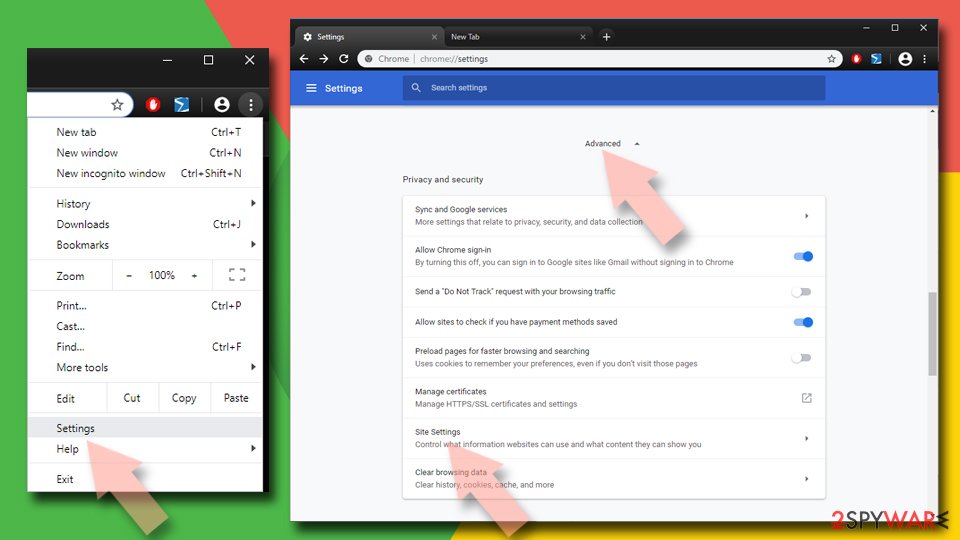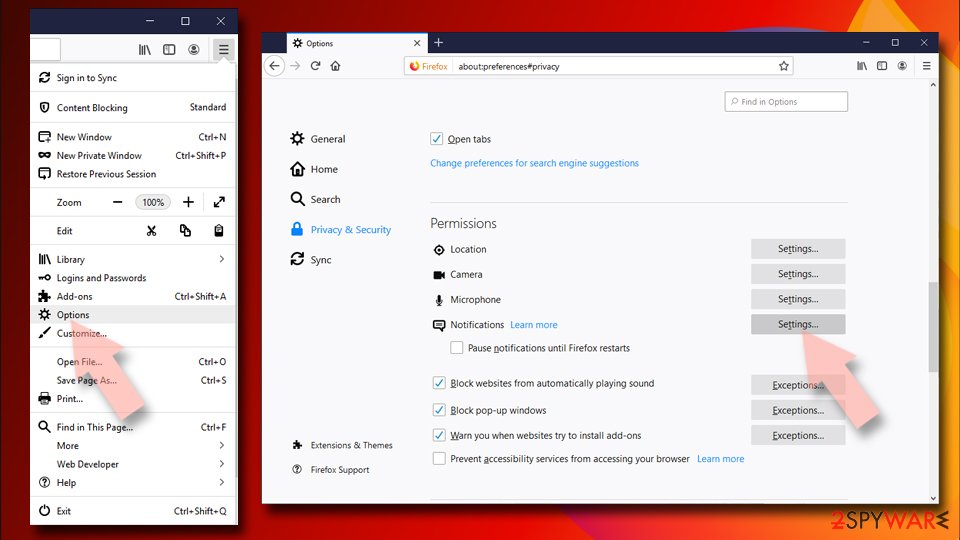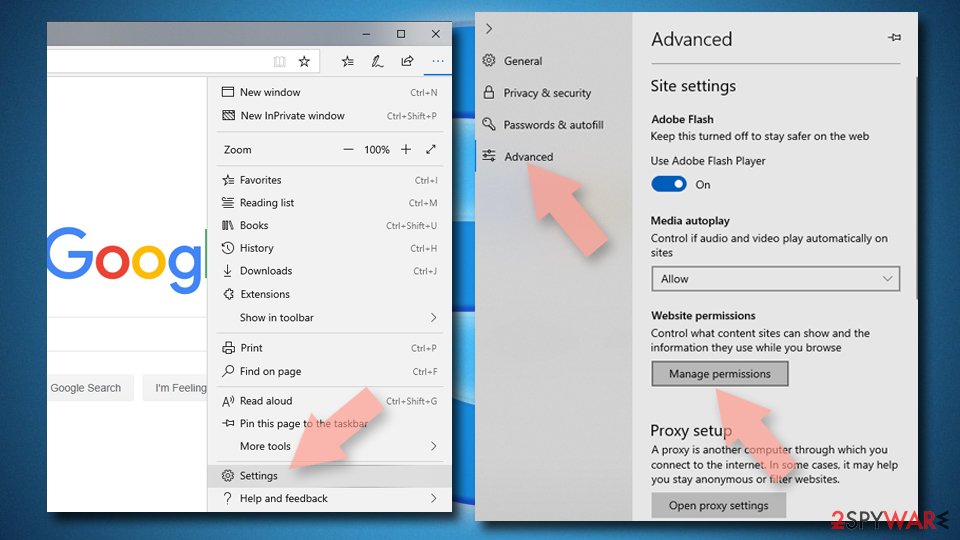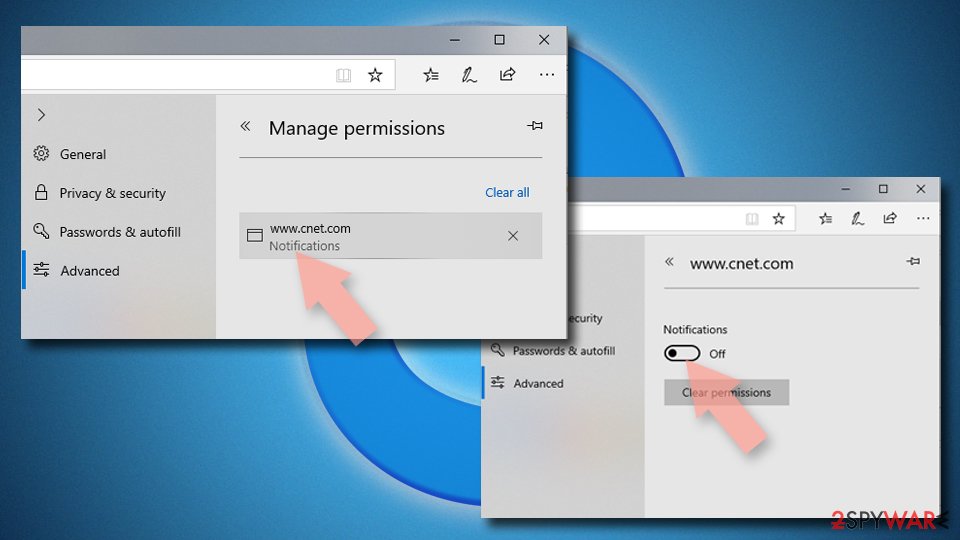Hurirk.net ads (scam) - Free Instructions
Hurirk.net ads Removal Guide
What is Hurirk.net ads?
Hurirk.net ads might bring you to dangerous places on the internet

There are plenty of websites that are created to trick people into performing certain actions – be it provide personal information, download suspicious software, or allow intrusive ads. Hurirk.net is one of many websites that uses scam and phishing techniques in order to make users subscribe to notifications from the site.
If you have pressed “Allow” as soon as you entered the site, you have granted permission for the site to show you pop-ups which can occur at random times (the frequency varies from a few times a day to several pop-ups every few minutes). This behavior is extremely intrusive and can interrupt all your work on Google Chrome, Mozilla Firefox, MS Edge, or any other web browser.
Embedded links or ads may redirect users to more dangerous websites, where their personal information might be stolen or malware downloaded and installed. In any case, if you are dealing with pop-up ads that won't go away, you should check the paragraphs below on what the phenomenon is and how to stop the notifications from being shown for good.
| Name | Hurirk.net |
|---|---|
| Type | Push notifications, pop-ups, ads |
| IP address | 104.21.41.48, 172.67.159.248 |
| Appearence | As soon as the “Allow” button is pressed within the notification prompt |
| Symptoms | Notifications might be shown at random times, frequency of which varies from device to device |
| Dangers | Clicking on links that are embedded within the notification prompt, exploring the sites these links bring to or downloading files can be particularly dangerous – you can get infected with malware, suffer from financial losses and privacy issues |
| Deletion | To stop the unwanted notifications from being shown, you need to access the web browser settings and block the site in question; if you experience frequent redirects to suspicious sites, check your system for adware |
| Further steps | Cleaning web browsers is just as important when dealing with potentially unwanted programs, so do so by following the instructions below or use FortectIntego as an automatic fix |
Many users believe that their computers have been infected because they see Hurirk.net notifications and ads frequently. However, this could be or could not be true, as each situation varies from person to person.
You could have accessed the site after being redirected from anywhere else on the internet – this usually happens when you click on deceptive or malicious links. Browser redirects through several domains are also possible – these are usually triggered automatically until users end up on a particular landing page.
This issue can be easily addressed: all you have to do is simply leave the site as soon as possible and never click on anything. Unfortunately, some less experienced computer users are unaware that some of these landing pages might be of malicious origin and believe what is said there.
Another reason why you might have ended up on the Hurirk.net site is because of adware.[1] These potentially unwanted programs commonly travel within software bundles or are distributed via deceptive ads, which commonly results in unintentional installation. In other cases, adware might be installed intentionally without people initially knowing about the full (unwanted or malicious) capabilities of the app.
This is why it is important to check your system and remove adware or any other malicious programs. You can look for PUPs manually, although this might be rather difficult, especially if you use many different apps (it is impossible to know which program is initiating these ads without thorough analysis).
The easiest way to identify and delete adware is by scanning your device with powerful anti-malware software. We recommend using one of these tools:
Keep in mind that having a powerful security application is your first line of defense against potentially unwanted programs, malicious sites, and malware. All you have to do is make sure you have automatic updates enabled so that the database would be renewed automatically as required. Also, cleaning web browsers after adware infection is a mandatory practice, so you should check how to do that below or employ a powerful cleaning tool FortectIntego.
It is important to note that anti-malware software will not remove Hurirk.net ads for you; the pop-ups were enabled through a browser feature. You can find all the details on how to fix this situation below.
Scam engineering: how to avoid being tricked online
Push notifications are initially a legitimate feature implemented by all modern browsers. It allows websites to deliver the latest news and other information directly to users. For this to take effect, users need to agree for these notifications to be shown in the first place, hence many websites provide a prompt upon entry that asks whether or not visitors would like to receive them.
Malicious actors quickly realized that this feature could be abused as long as users are tricked into allowing the notifications to be shown in the first place. Victims rarely realize that they have been fooled, as crooks use social engineering[2] to make them believe that the notifications prompt is anything but what it actually is.
Here is one example of a message you might see upon entering the site:
Click “Allow” if you are not a robot
In this example, crooks abuse the familiar security feature used by many websites to prevent DDoS[3] and bot attacks. This way, users believe that all they do by pressing the “allow” button is passing a simple identification check, which is obviously not the case.
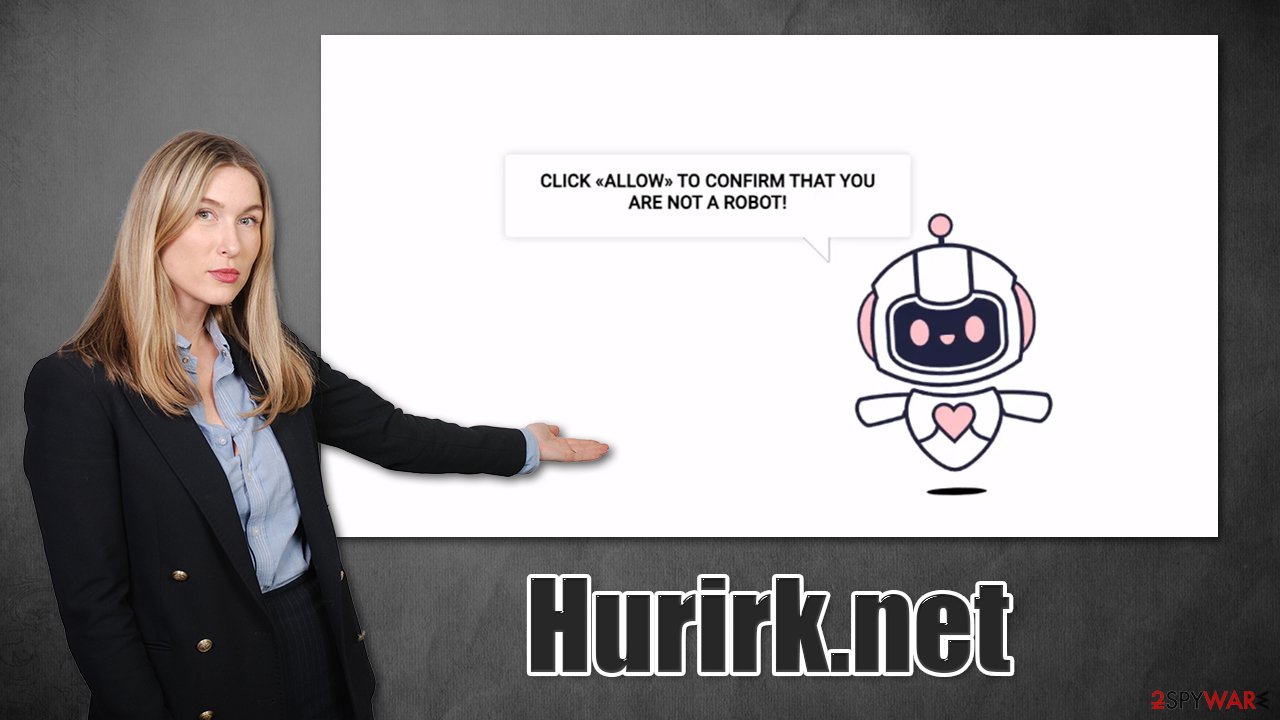
Push notifications can include any kind of information – primarily, links. Once clicked, these links allow the actors to gain monetary benefits, although they definitely do not care about user experience, hence often insecure advertisement networks are used. This is how users end up being exposed to scams, phishing, and malware-laden links, which can be very dangerous.
This is why you should never trust sites like Worldtimes.xyz, News-pezesu.cc, or Stoutlionslick.com and never enable notifications in the first place. If you want to stop Hurirk.net ads, follow the instructions in the next section.
Stop the intrusive notifications
If you have checked your device for adware and nothing was found (although you continue to receive the annoying pop-ups), you are not alone. Thousands of users are looking for ways on how to remove the notifications for good. Luckily, this is not that difficult – just follow the instructions below.
Google Chrome (desktop):
- Open Google Chrome browser and go to Menu > Settings.
- Scroll down and click on Advanced.
- Locate Privacy and security section and pick Site Settings > Notifications.
![Stop notifications on Chrome PC 1 Stop notifications on Chrome PC 1]()
- Look at the Allow section and look for a suspicious URL.
- Click the three vertical dots next to it and pick Block. This should remove unwanted notifications from Google Chrome.
![Stop notifications on Chrome PC 2 Stop notifications on Chrome PC 2]()
Google Chrome (Android):
- Open Google Chrome and tap on Settings (three vertical dots).
- Select Notifications.
- Scroll down to Sites section.
- Locate the unwanted URL and toggle the button to the left (Off setting).
![Stop notifications on Chrome Android Stop notifications on Chrome Android]()
Mozilla Firefox:
- Open Mozilla Firefox and go to Menu > Options.
- Click on Privacy & Security section.
- Under Permissions, you should be able to see Notifications. Click Settings button next to it.
![Stop notifications on Mozilla Firefox 1 Stop notifications on Mozilla Firefox 1]()
- In the Settings – Notification Permissions window, click on the drop-down menu by the URL in question.
- Select Block and then click on Save Changes. This should remove unwanted notifications from Mozilla Firefox.
![Stop notifications on Mozilla Firefox 2 Stop notifications on Mozilla Firefox 2]()
Safari:
- Click on Safari > Preferences…
- Go to Websites tab and, under General, select Notifications.
- Select the web address in question, click the drop-down menu and select Deny.
![Stop notifications on Safari Stop notifications on Safari]()
MS Edge:
- Open Microsoft Edge, and click the Settings and more button (three horizontal dots) at the top-right of the window.
- Select Settings and then go to Advanced.
- Under Website permissions, pick Manage permissions and select the URL in question.
![Stop notifications on Edge 1 Stop notifications on Edge 1]()
- Toggle the switch to the left to turn notifications off on Microsoft Edge.
![Stop notifications on Edge 2 Stop notifications on Edge 2]()
MS Edge (Chromium):
- Open Microsoft Edge, and go to Settings.
- Select Site permissions.
- Go to Notifications on the right.
- Under Allow, you will find the unwanted entry.
- Click on More actions and select Block.
![Stop notifications on Edge Chromium Stop notifications on Edge Chromium]()
Internet Explorer:
- Open Internet Explorer, and click on the Gear icon at the top-right on the window.
- Select Internet options and go to Privacy tab.
- In the Pop-up Blocker section, click on Settings.
- Locate web address in question under Allowed sites and pick Remove.
![Stop notifications on Internet Explorer Stop notifications on Internet Explorer]()
Bonus tip: disable notification prompts
If you find the notification prompts rather annoying as we do, you might as well disable the prompt via the web browser settings. If needed, you can still call it up from the URL bar and accept the notifications in that way. However, disabling them will not bug you every time you access a site that offers its messaging service.
- Open Google Chrome
- Go to Menu > Settings
- Scroll down to Privacy and security section
- Select Site Settings
- Scroll down again and pick Notifications
- Choose Use quieter messaging option.
You can also choose Don't allow sites to show notifications if you don't want to deal with them at all.
You may remove virus damage with a help of FortectIntego. SpyHunter 5Combo Cleaner and Malwarebytes are recommended to detect potentially unwanted programs and viruses with all their files and registry entries that are related to them.
Getting rid of Hurirk.net ads. Follow these steps
Remove from Google Chrome
Delete malicious extensions from Google Chrome:
- Open Google Chrome, click on the Menu (three vertical dots at the top-right corner) and select More tools > Extensions.
- In the newly opened window, you will see all the installed extensions. Uninstall all the suspicious plugins that might be related to the unwanted program by clicking Remove.

Clear cache and web data from Chrome:
- Click on Menu and pick Settings.
- Under Privacy and security, select Clear browsing data.
- Select Browsing history, Cookies and other site data, as well as Cached images and files.
- Click Clear data.

Change your homepage:
- Click menu and choose Settings.
- Look for a suspicious site in the On startup section.
- Click on Open a specific or set of pages and click on three dots to find the Remove option.
Reset Google Chrome:
If the previous methods did not help you, reset Google Chrome to eliminate all the unwanted components:
- Click on Menu and select Settings.
- In the Settings, scroll down and click Advanced.
- Scroll down and locate Reset and clean up section.
- Now click Restore settings to their original defaults.
- Confirm with Reset settings.

Remove from Microsoft Edge
Delete unwanted extensions from MS Edge:
- Select Menu (three horizontal dots at the top-right of the browser window) and pick Extensions.
- From the list, pick the extension and click on the Gear icon.
- Click on Uninstall at the bottom.

Clear cookies and other browser data:
- Click on the Menu (three horizontal dots at the top-right of the browser window) and select Privacy & security.
- Under Clear browsing data, pick Choose what to clear.
- Select everything (apart from passwords, although you might want to include Media licenses as well, if applicable) and click on Clear.

Restore new tab and homepage settings:
- Click the menu icon and choose Settings.
- Then find On startup section.
- Click Disable if you found any suspicious domain.
Reset MS Edge if the above steps did not work:
- Press on Ctrl + Shift + Esc to open Task Manager.
- Click on More details arrow at the bottom of the window.
- Select Details tab.
- Now scroll down and locate every entry with Microsoft Edge name in it. Right-click on each of them and select End Task to stop MS Edge from running.

If this solution failed to help you, you need to use an advanced Edge reset method. Note that you need to backup your data before proceeding.
- Find the following folder on your computer: C:\\Users\\%username%\\AppData\\Local\\Packages\\Microsoft.MicrosoftEdge_8wekyb3d8bbwe.
- Press Ctrl + A on your keyboard to select all folders.
- Right-click on them and pick Delete

- Now right-click on the Start button and pick Windows PowerShell (Admin).
- When the new window opens, copy and paste the following command, and then press Enter:
Get-AppXPackage -AllUsers -Name Microsoft.MicrosoftEdge | Foreach {Add-AppxPackage -DisableDevelopmentMode -Register “$($_.InstallLocation)\\AppXManifest.xml” -Verbose

Instructions for Chromium-based Edge
Delete extensions from MS Edge (Chromium):
- Open Edge and click select Settings > Extensions.
- Delete unwanted extensions by clicking Remove.

Clear cache and site data:
- Click on Menu and go to Settings.
- Select Privacy, search and services.
- Under Clear browsing data, pick Choose what to clear.
- Under Time range, pick All time.
- Select Clear now.

Reset Chromium-based MS Edge:
- Click on Menu and select Settings.
- On the left side, pick Reset settings.
- Select Restore settings to their default values.
- Confirm with Reset.

Remove from Mozilla Firefox (FF)
Remove dangerous extensions:
- Open Mozilla Firefox browser and click on the Menu (three horizontal lines at the top-right of the window).
- Select Add-ons.
- In here, select unwanted plugin and click Remove.

Reset the homepage:
- Click three horizontal lines at the top right corner to open the menu.
- Choose Options.
- Under Home options, enter your preferred site that will open every time you newly open the Mozilla Firefox.
Clear cookies and site data:
- Click Menu and pick Settings.
- Go to Privacy & Security section.
- Scroll down to locate Cookies and Site Data.
- Click on Clear Data…
- Select Cookies and Site Data, as well as Cached Web Content and press Clear.

Reset Mozilla Firefox
If clearing the browser as explained above did not help, reset Mozilla Firefox:
- Open Mozilla Firefox browser and click the Menu.
- Go to Help and then choose Troubleshooting Information.

- Under Give Firefox a tune up section, click on Refresh Firefox…
- Once the pop-up shows up, confirm the action by pressing on Refresh Firefox.

Delete from Safari
Remove unwanted extensions from Safari:
- Click Safari > Preferences…
- In the new window, pick Extensions.
- Select the unwanted extension and select Uninstall.

Clear cookies and other website data from Safari:
- Click Safari > Clear History…
- From the drop-down menu under Clear, pick all history.
- Confirm with Clear History.

Reset Safari if the above-mentioned steps did not help you:
- Click Safari > Preferences…
- Go to Advanced tab.
- Tick the Show Develop menu in menu bar.
- From the menu bar, click Develop, and then select Empty Caches.

After uninstalling this potentially unwanted program (PUP) and fixing each of your web browsers, we recommend you to scan your PC system with a reputable anti-spyware. This will help you to get rid of Hurirk.net registry traces and will also identify related parasites or possible malware infections on your computer. For that you can use our top-rated malware remover: FortectIntego, SpyHunter 5Combo Cleaner or Malwarebytes.
How to prevent from getting adware
Choose a proper web browser and improve your safety with a VPN tool
Online spying has got momentum in recent years and people are getting more and more interested in how to protect their privacy online. One of the basic means to add a layer of security – choose the most private and secure web browser. Although web browsers can't grant full privacy protection and security, some of them are much better at sandboxing, HTTPS upgrading, active content blocking, tracking blocking, phishing protection, and similar privacy-oriented features. However, if you want true anonymity, we suggest you employ a powerful Private Internet Access VPN – it can encrypt all the traffic that comes and goes out of your computer, preventing tracking completely.
Lost your files? Use data recovery software
While some files located on any computer are replaceable or useless, others can be extremely valuable. Family photos, work documents, school projects – these are types of files that we don't want to lose. Unfortunately, there are many ways how unexpected data loss can occur: power cuts, Blue Screen of Death errors, hardware failures, crypto-malware attack, or even accidental deletion.
To ensure that all the files remain intact, you should prepare regular data backups. You can choose cloud-based or physical copies you could restore from later in case of a disaster. If your backups were lost as well or you never bothered to prepare any, Data Recovery Pro can be your only hope to retrieve your invaluable files.
- ^ Adware. Wikipedia. The free encyclopedia.
- ^ What is Social Engineering?. Kaspersky. Resource Center.
- ^ Josh Fruhlinger. DDoS explained: How distributed denial of service attacks are evolving. CSO Online. Advice for IT security.
